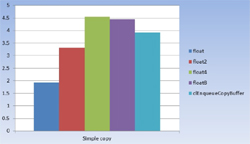
- #CONFERENCE OPENCL BENCHMARK HOW TO#
- #CONFERENCE OPENCL BENCHMARK FULL#
- #CONFERENCE OPENCL BENCHMARK CODE#
The questions in the form are unchanged, so all submissions will work. If you have fetched the assignment form prior to August 20, you will still see this wrong introduction. This is not the case, the ranking will be done only based on the submitted answers. By mistake, the first released assignment form states that we plan for personal interviews. Please submit all answers in the Jupyter evaluation tool at starting August 10. The technical questions have been released on August 10. Which of the following lectures have you attended or successfully passed.Git version control and handling of open source projects.Agile development and continuous integration.Accelerator programming (OpenCL, CUDA, other) or other programming projects.What is your background knowledge or practical experience in.The questions on your background include the following aspects Participant Backgroundįor the assignment phase, we have prepared a set of questions on your personal experience and study background in the topics relevant for this project and a set of technical questions.
#CONFERENCE OPENCL BENCHMARK HOW TO#
The further project organization will be performed in gitlab at Įmail instructions on how to get access have been sent. Peak operations / local memory requires usage of all (~90%) resources.
#CONFERENCE OPENCL BENCHMARK CODE#


However, they lack a systematic coverage of FPGAs' architectural features. With FPGAs emerging as an important accelerator technology for datacenter and HPC, a few of those benchmarks have been functionally ported to FPGAs using OpenCL.
#CONFERENCE OPENCL BENCHMARK FULL#
For CPUs and partially for GPUs, a variaty of benchmarks exists on various levels of abstraction, from pure microbenchmarks over simple kernels taken out of real world applications, up to the full application with realistic input data sets. Kickoff Meeting on Friday October 11, 9:15 in room 2.267īenchmarks are an important tool to characterize computer systems, compare them to other systems and identify strenghts and weaknesses. 11 Students assigned by central distribution, possibly 1 space free for redistribution


 0 kommentar(er)
0 kommentar(er)
